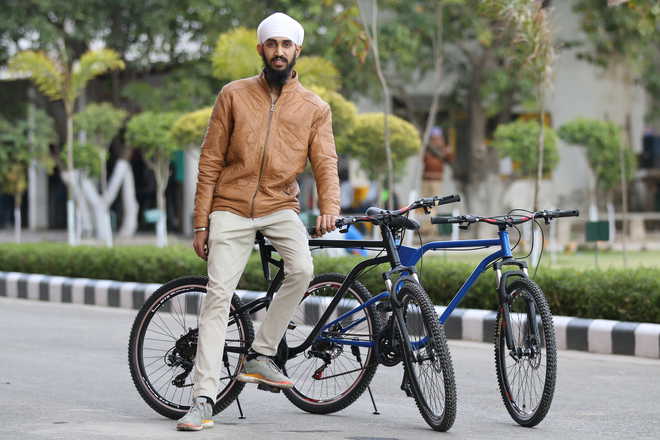
Chandigarh Group of Colleges’ Trilok Singh with his single-frame, GPS- fitted bicycle.
Vijay C Roy in Chandigarh
Latest figures from the World Intellectual Property Organization (WIPO) say India has registered far fewer research applications (patents) than others such as the US (long-time leader), China and Japan. Two Chinese technology companies were the top filers of international patent applications in 2017, with Huawei (number one filer) and ZTE (number two) followed by Intel, Mitsubishi and Qualcomm. “This rapid rise in Chinese use of the international patent system shows that innovators there are increasingly looking outward, seeking to spread their original ideas into new markets as the Chinese economy continues its rapid transformation,” Director General, Francis Gurry.
Education institutes across India have started adopting progressive approach towards innovation and filing patents. They have a long way ahead. An annual 2016-17 report of the office of the Controller General of Patents, Designs, Trade Marks & Geographical Indications, Mumbai, shows that two Punjab-based educational institutes are among the top 10 filing applicants for patents. Punjab, despite having high concentrations of micro, small and medium enterprises, doesn’t figure among the top 10. With 207 applications, it stood 12th.
Punjab-based Chandigarh Group of Colleges and Chitkara University occupied the seven and eighth position respectively. The former has filed 30 applications for patents while Chitkara University has filed 29 applicants for patents in 2016-17. How many of them would be eligible for getting patents remains to be seen. The fact that students are filing for patents clearly suggests a growing concern for protecting innovations. Take a look at various products filed for patents:
Communication device for the speech impaired: The real-time equipment allows normal communication. It is a wearable headband with dry electrode sensors which convert brain’s beta waves into graphical waves in real time. The output is broadcast in sound waves using speakers. The inventors are Sonanashu, Trinkush Singh and Dr Sachina Ahuja of Chitkara University.
Detecting multiple diseases in apple and rice crop: It is a handheld device whose patent is filed by Dr Sheifali Gupta. Another patent for farmer interactive remotely controlled rice crop disease detection system is filed as a patent in addition, where the image processing technologies develop a computer-based algorithm for disease classification in rice crops. The inventors are Dr Sheifali Gupta, Satpal Singh, Sagar Junehja, Dr Rupesh Gupta (Chitkara University).
Paperless erasable magnetic Braille slate: The patent is filed by Amitoj Singh, Virender Kadiyan, Vinay Kukreja and Dr Amandeep Singh Oberoi (Chitkara University). The patent won in a prestigious contest involving 12 countries. The inventors were called for a presentation at the UNDP headquarters in New York. The device assists in teaching words and syntax to the visually impaired by using magnetic balls arranged in cells of the magnetic Braille slate. This device can be used for Braille writing, locating and entering the formation using magnetic stylus on the slate.
Measuring thyroid levels in blood: The device can predict thyroid levels which can facilitates proper and on time medication/treatment. The handheld device can be used by individuals or clinicians. The inventors are Gurpreet Kaur Sagoo, Dr Varsha Singh, Dr Nitin Saluja, (Chitkara University).
Women self-defence: It can give cover to the girls in a difficult time by sending out alerts to the police and relatives. The band is also fitted with a knife, which can be activated for the self-defence. The device was developed by Chanpreet & Rachna, Chandigarh Group of Colleges.
Advance flood warning: It is a warning-cum-mitigation device. It detects a flood-like situation and sends signals to a nearby area. It not only detects live conditions but also uses the floor occurrence data to enable the person to read frequencies from water beneath the earth (Chandigarh Group of Colleges). Sanjeet Singh, associate dean research & head CU-TBI, Chandigarh University, says the university offers 18-month incubation period that includes a startup cabin with a 3D printing facility, an advance manufacturing lab, a conference hall and a convention Centre.
“We have introduced research and innovation at undergraduate level to promote creative ideas. The filing of applications by us clearly suggests that students are innovative,” says chairman, Chandigarh Group of Colleges Satnam Singh Sadhu. Chitkara University has DST and MSME-approved incubator where it nurtures start-ups.



























